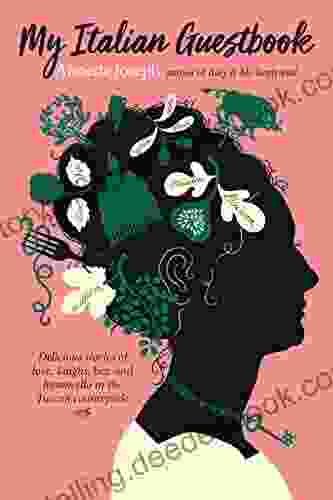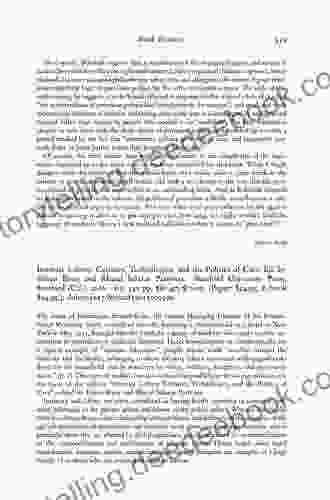Cultures, Technologies, and the Politics of Care: Exploring the Interwoven Dimensions of Healthcare

Healthcare, as a multifaceted domain, is deeply intertwined with cultural norms, technological advancements, and political decisions. Understanding the intricate interrelationships among these dimensions is crucial for fostering a comprehensive and equitable approach to healthcare delivery. This article delves into the complex dynamics of cultures, technologies, and the politics of care, shedding light on their profound impact on healthcare systems and patient experiences.
Cultural Influences on Healthcare
Culture encompasses a vast array of shared beliefs, values, practices, and traditions that significantly shape our understanding of health and illness. Cultural factors influence how individuals perceive symptoms, interact with healthcare professionals, and make decisions about their care.
4.1 out of 5
| Language | : | English |
| File size | : | 883 KB |
| Text-to-Speech | : | Enabled |
| Screen Reader | : | Supported |
| Enhanced typesetting | : | Enabled |
| Word Wise | : | Enabled |
| Print length | : | 358 pages |
Health Beliefs and Practices: Different cultures have unique beliefs about the causes and treatment of illness. For example, some cultures attribute illness to supernatural forces, while others view it as a result of natural imbalances. These beliefs influence treatment-seeking behaviors, preferences for traditional or Western medicine, and compliance with medical recommendations.
Healthcare Communication: Cultural norms impact communication between healthcare providers and patients. Language barriers, cultural differences in nonverbal cues, and varying expectations about patient autonomy can lead to misunderstandings and communication breakdowns. Effective communication requires sensitivity to cultural nuances and tailored approaches to information sharing and decision-making.
Social Support and Caregiving: Family and community play essential roles in healthcare within many cultures. Traditional healthcare systems often involve extended family members and community caregivers providing support and assistance. However, cultural expectations about caregiving responsibilities can vary widely, influencing the availability and quality of care.
Technological Advancements in Healthcare
Technology has revolutionized healthcare, introducing innovative diagnostic tools, treatment modalities, and healthcare delivery models. These advancements have the potential to improve patient outcomes, reduce healthcare costs, and increase accessibility to care.
Diagnostic and Treatment Tools: Medical imaging technologies, such as X-rays, CT scans, and MRIs, provide invaluable insights into the human body, enabling early detection and more precise interventions. Minimally invasive surgical techniques, robotic surgery, and personalized medicine tailored to individual genetic profiles are further examples of technological advancements transforming healthcare.
Telehealth and Remote Monitoring: Telemedicine platforms connect patients with healthcare providers remotely, increasing access to care for individuals in remote areas or with mobility limitations. Remote monitoring devices allow for continuous tracking of vital parameters, enabling early detection of health issues and proactive interventions.
Artificial Intelligence (AI) and Machine Learning: AI and machine learning algorithms are being applied to analyze vast amounts of healthcare data, identifying patterns, predicting outcomes, and aiding in clinical decision-making. AI-powered systems can assist with diagnosis, treatment planning, and personalized recommendations.
Politics and the Shaping of Healthcare
Healthcare is inherently political, as government policies, funding decisions, and regulations impact the availability, accessibility, and quality of care. Political ideologies and economic factors shape healthcare systems and influence healthcare outcomes.
Healthcare Financing: The financing of healthcare varies significantly across countries, ranging from government-funded universal healthcare systems to private insurance models. Funding decisions impact healthcare coverage, access to services, and the distribution of resources.
Healthcare Regulation: Governments regulate healthcare through laws and policies aimed at ensuring patient safety, quality of care, and ethical practices. Regulations govern the licensing of healthcare professionals, the approval of new drugs and technologies, and the setting of standards for healthcare facilities.
Health Policy and Advocacy: Health policy decisions made by elected officials and public health organizations influence healthcare priorities, funding allocation, and the implementation of public health initiatives. Advocacy groups play a crucial role in shaping healthcare policies and ensuring the voices of patients and healthcare professionals are heard.
Interwoven Dimensions and the Politics of Care
The complexities of healthcare arise from the interconnectedness of cultures, technologies, and politics. These dimensions interact and influence each other, shaping healthcare systems and patient experiences.
Cultural Responsivity and Technology: Cultural sensitivity is essential when implementing new healthcare technologies. Technologies must be designed to address cultural differences in health beliefs, communication styles, and caregiving practices.
Equity and Access: Political decisions and funding priorities impact healthcare equity and access. Ensuring equal access to quality healthcare for all individuals, regardless of cultural background or socioeconomic status, is a fundamental challenge for healthcare systems.
Empowerment and Patient-Centered Care: Empowering patients with information and technology enables them to actively participate in their healthcare decisions. Patient-centered care models prioritize the patient's voice, preferences, and cultural beliefs.
Cultures, technologies, and the politics of care are intertwined dimensions that profoundly influence healthcare systems and patient experiences. Understanding the complex dynamics between these dimensions is essential for developing comprehensive, equitable, and culturally responsive healthcare approaches.
By recognizing and addressing cultural variations, harnessing the power of technology, and engaging in informed political discourse, we can create healthcare systems that meet the unique needs of diverse populations, empower patients, and advance the pursuit of health and well-being for all.
4.1 out of 5
| Language | : | English |
| File size | : | 883 KB |
| Text-to-Speech | : | Enabled |
| Screen Reader | : | Supported |
| Enhanced typesetting | : | Enabled |
| Word Wise | : | Enabled |
| Print length | : | 358 pages |
Do you want to contribute by writing guest posts on this blog?
Please contact us and send us a resume of previous articles that you have written.
 Book
Book Chapter
Chapter Story
Story Library
Library E-book
E-book Magazine
Magazine Glossary
Glossary Bibliography
Bibliography Footnote
Footnote Manuscript
Manuscript Scroll
Scroll Codex
Codex Tome
Tome Bestseller
Bestseller Biography
Biography Memoir
Memoir Encyclopedia
Encyclopedia Thesaurus
Thesaurus Resolution
Resolution Librarian
Librarian Catalog
Catalog Borrowing
Borrowing Stacks
Stacks Archives
Archives Periodicals
Periodicals Study
Study Research
Research Scholarly
Scholarly Lending
Lending Reserve
Reserve Journals
Journals Reading Room
Reading Room Rare Books
Rare Books Special Collections
Special Collections Literacy
Literacy Study Group
Study Group Thesis
Thesis Reading List
Reading List Book Club
Book Club Textbooks
Textbooks Jane Streeton
Jane Streeton Isla Chiu
Isla Chiu Darryl Carr
Darryl Carr Mari Silva
Mari Silva Charles Sid Heal
Charles Sid Heal 2012th Edition Kindle Edition
2012th Edition Kindle Edition Martyn Whittock
Martyn Whittock Richard Penn Smith
Richard Penn Smith Indie Hayes
Indie Hayes Paul Traynor
Paul Traynor Karen E Chin
Karen E Chin Nick Pernisco
Nick Pernisco Jim Ruland
Jim Ruland Robert Kelchen
Robert Kelchen Eduard H Hovy
Eduard H Hovy Angelo Codevilla
Angelo Codevilla George Herbert
George Herbert Anne Mitchell Whisnant
Anne Mitchell Whisnant Richard Brestoff
Richard Brestoff 1st Edition Kindle Edition
1st Edition Kindle Edition
Light bulbAdvertise smarter! Our strategic ad space ensures maximum exposure. Reserve your spot today!

 Foster HayesBuccaneers, Privateers, and Jamie Mcfarlane: Tales of Swashbuckling Adventure...
Foster HayesBuccaneers, Privateers, and Jamie Mcfarlane: Tales of Swashbuckling Adventure...
 Dustin RichardsonPink Mimosa: The Enchanting Beauty of Tiffany Singleton's Floral Masterpieces
Dustin RichardsonPink Mimosa: The Enchanting Beauty of Tiffany Singleton's Floral Masterpieces
 Federico García LorcaHuman Auditory Development: Springer Handbook of Auditory Research 42
Federico García LorcaHuman Auditory Development: Springer Handbook of Auditory Research 42 Fyodor DostoevskyFollow ·8.5k
Fyodor DostoevskyFollow ·8.5k Eugene ScottFollow ·15.6k
Eugene ScottFollow ·15.6k Gene PowellFollow ·9.4k
Gene PowellFollow ·9.4k Caleb LongFollow ·5.2k
Caleb LongFollow ·5.2k Theodore MitchellFollow ·8.4k
Theodore MitchellFollow ·8.4k Gerald BellFollow ·16.2k
Gerald BellFollow ·16.2k Hamilton BellFollow ·4.6k
Hamilton BellFollow ·4.6k Emanuel BellFollow ·18.3k
Emanuel BellFollow ·18.3k

 Howard Blair
Howard BlairClassical Music Themes for Easy Mandolin, Volume One
Classical Music Themes for Easy Mandolin,...

 Paulo Coelho
Paulo CoelhoThe Heretic Tomb: Unraveling the Mysteries of a Lost...
Synopsis In Simon Rose's captivating debut...

 Rodney Parker
Rodney ParkerThe Passionate Friends Annotated Wells: A Deeper...
Unveiling the...

 Ed Cooper
Ed CooperDelicious Stories of Love, Laughs, Lies, and Limoncello...
In the heart of...

 Elmer Powell
Elmer PowellHal Leonard Piano For Kids Songbook: Unleashing the...
Music holds immense...
4.1 out of 5
| Language | : | English |
| File size | : | 883 KB |
| Text-to-Speech | : | Enabled |
| Screen Reader | : | Supported |
| Enhanced typesetting | : | Enabled |
| Word Wise | : | Enabled |
| Print length | : | 358 pages |








